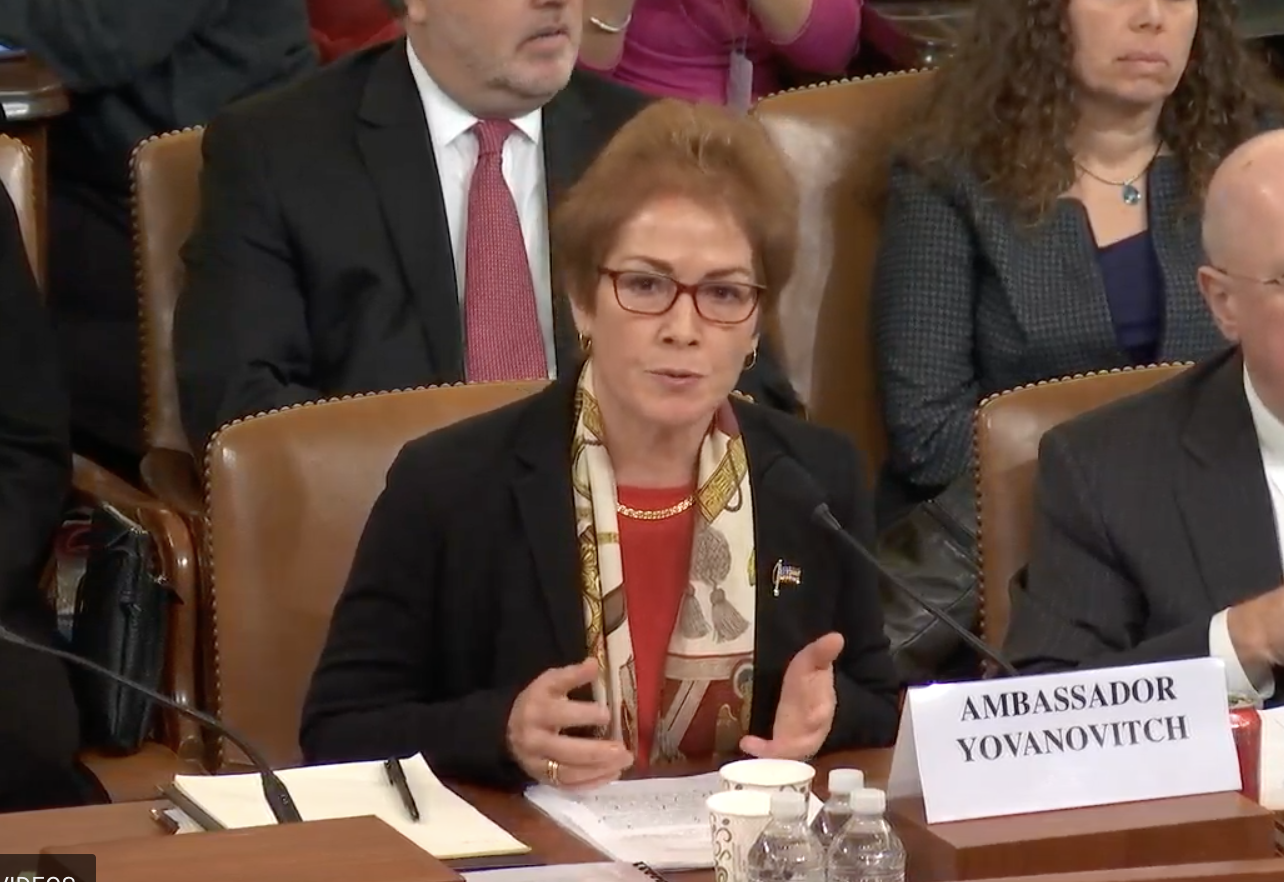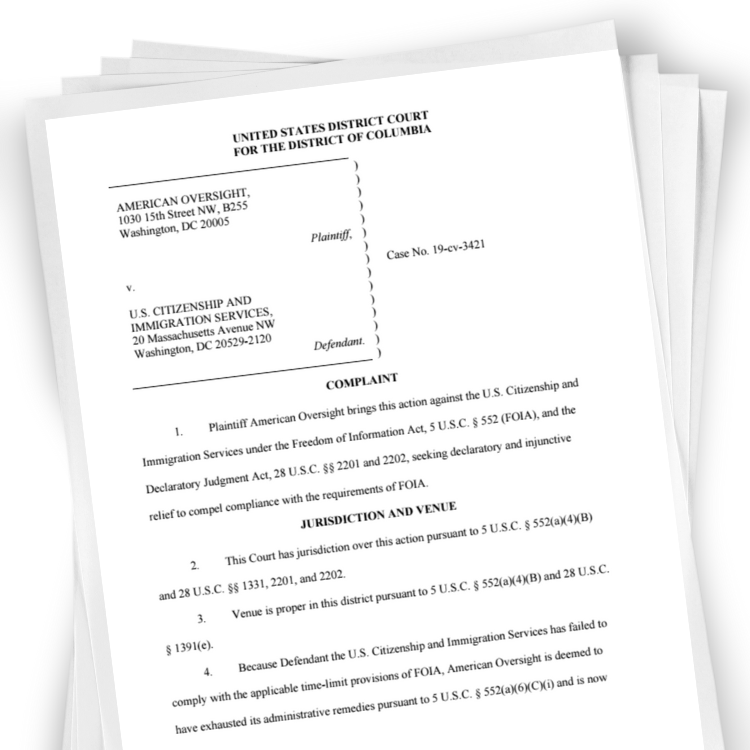
News Roundup: Impeachment Inquiry Goes Public
The latest on the impeachment inquiry, plus more on our investigations into Pompeo's political ambitions and threats to voting rights at the state level.

This week, the House’s impeachment inquiry went public, with Ambassador Marie Yovanovitch, Deputy Assistant Secretary of State George Kent, and acting Ambassador to Ukraine Bill Taylor appearing before the House Intelligence Committee in televised hearings.
Kent and Taylor testified about the irregular shadow diplomatic efforts led by Rudy Giuliani and associates to advance President Donald Trump’s desire for a Ukraine-announced investigation into Joe Biden. Taylor said that he was told that the president was more concerned with securing such an investigation than in actual anti-corruption efforts in Ukraine. He also discussed a cellphone conversation between Trump and Ambassador to the EU Gordon Sondland that one of his staffers overheard, in which the president mentioned “investigations.” (The next day, Thursday, the AP reported that a second embassy staffer had also overheard the conversation.)
Yovanovitch’s testimony centered on the Giuliani-led smear campaign against her that brought about her recall in May, and on the State Department’s failure to support or protect her against those efforts. American Oversight has multiple lawsuits for records related to the Trump administration’s contacts with Ukraine, and our lawsuit against the State Department involves documents related to Yovanovitch’s recall and State Department communications with Giuliani and his allies.
The defense strategy adopted by Trump allies and House Republicans relied significantly on pointing out that the witnesses had not communicated directly with the president about the push for a politically motivated investigation. Of course, such a defense conveniently ignores a key point: that the administration has refused to comply with many of the subpoena requests, and the State Department has refused to turn over documents requested by Congress.
But next week comes the court-ordered deadline for the State Department to turn over multiple categories of documents that American Oversight is suing for, including directives ordering Yovanovitch’s recall. The paper trail will soon start to unfold.
As the impeachment investigation continues to heat up, here’s what else American Oversight has been working on this week:
Stephen Miller’s Far-Right Influence: According to emails uncovered by the Southern Poverty Law Center, White House Senior Adviser Stephen Miller promoted white nationalism and extremist ideas through the conservative website Breitbart in the lead-up to the 2016 election. Multiple members of Congress have called upon Miller to resign, and the report shines another light on the ultra-conservative anti-immigration views of one of the president’s longest-serving advisers. American Oversight has been investigating Miller’s influence across the administration, and this week filed more than a dozen new FOIA requests for his communications at multiple agencies.
Roy Bailey: American Oversight has obtained Energy Department calendars that show numerous meetings with Roy Bailey, a business partner of Rudy Giuliani and Republican donor who has lobbied the department on natural gas issues. Given Perry’s attempts this past spring to add multiple U.S. board members to the Ukrainian gas company Naftogaz at the same time that Giuliani allies tried to do the same, we want to know more about Bailey’s communications with the Energy Department.
CEQ Communications: The former associate director for regulatory reform at the Council on Environmental Quality, Mario Loyola, recently joined the Competitive Enterprise Institute, a right-wing nonprofit that lists “energy and environment” as an area of focus. We filed FOIA requests to learn whether and to what extent Loyola was communicating with the institute or other similar organizations during his time at CEQ.
Barring Immigrants Who Can’t Afford Health Care: Last month, Trump announced that certain immigrants would no longer be allowed to enter the country unless they had “the financial resources to pay for reasonably foreseeable medical costs.” The announcement drew widespread criticism, not to mention questions about how such a policy would be implemented or even whether it would be legal. We’re asking for records from the Centers for Medicare and Medicaid Services that could shed light on whether officials were working with outside groups, including insurance organizations, that would likely be involved in executing the proclamation.
Pompeo’s Kansas Jaunts: In an expansion of our investigation into how Secretary of State Mike Pompeo’s political ambitions extend beyond the Trump administration, we filed a new FOIA request for information about four recent trips he took to his home state of Kansas in the past year. Three of those were “official” taxpayer-funded trips ostensibly taken for agency business, but reports indicate that on at least one of those trips Pompeo met with political activists to discuss the upcoming Senate race. We want to know how taxpayer dollars were spent, and whether they were devoted to serving the secretary’s personal interests.
Shulkin’s Emails: On Friday, a federal judge declined to grant the government’s motion to dismiss American Oversight’s lawsuit against the Department of Veterans Affairs for failing to recover former Secretary David Shulkin’s official emails from personal accounts. You can read more here.
New Lawsuit: American Oversight filed a lawsuit this week against the Department of Homeland Security for failing to release documents — including calendars, emails, and text messages — that may shed light on the recent work of Ken Cuccinelli, who was just named the acting deputy secretary of homeland security.
“These are getting very personal”: Remember “Sharpiegate,” when Trump apparently doctored a weather map to show Alabama being in the path of Hurricane Dorian? The National Oceanic and Atmospheric Association released emails recently that show just how unavoidable that whole “controversy” was.
State Accountability Project Update
Georgia: Georgia officials announced a planned purge of 300,000 names from the state’s voter rolls late last month, alarming voting-rights advocates. We filed a public records request for communications about the planned removal, and records that could show steps taken to make sure the state is accurate. We also filed a request for communications between the secretary of state’s office and representatives of Dominion Voting Systems after voters encountered difficulties at the polls in the recent Nov. 5 election, and sent a number of requests to various counties for records related to any voting machine errors last week.
Florida: We filed public records requests with three offices within the Florida House of Representatives — those of Reps. Thad Altman, Mike La Rosa and Jason Fischer — for communications about federal or state redistricting or with key Republican strategists.
Texas: A new report found that Texas has closed more polling places than any state since the 2013 Supreme Court decision that gutted the Voting Rights Act’s preclearance provision. We filed records requests with three of the largest urban counties in Texas — Harris, Dallas and Travis — for communications related to closures of polling places.
